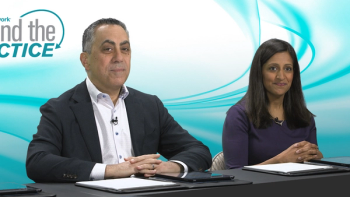
Christina Wu, MB, BCh, MD, shares the study design and efficacy data of the MOUNTAINEER-01 study, which explored combination tucatinib plus trastuzumab for the treatment of patients with HER2+ metastatic colorectal cancer.

Your AI-Trained Oncology Knowledge Connection!


Christina Wu, MB, BCh, MD, shares the study design and efficacy data of the MOUNTAINEER-01 study, which explored combination tucatinib plus trastuzumab for the treatment of patients with HER2+ metastatic colorectal cancer.

Daniel Walden, MD, presents the scenario of a 65-year-old man diagnosed with HER2+ metastatic colorectal cancer to the expert panel for discussion.

Experts emphasize the importance of acquiring both tissue and circulating tumor DNA (ctDNA) for molecular testing in patients with metastatic colorectal cancer, address challenges such as lack of tissue and costs, and highlight the role of HER2 as a biomarker.

Daniel Ahn, DO, discusses the evolution of biomarker testing in metastatic colorectal cancer, highlighting the shift from understanding only the prognostic implications of genetic alterations to recognizing their predictive role in targeted therapies, and emphasizes the potential of circulating tumor DNA for rapid diagnosis and assessing treatment response.

Tanios Bekaii-Saab, MD, and colleagues address updates in metastatic colorectal cancer treatment, highlighting its prevalence in the U.S., the concerning rise in younger patients, and the ongoing uncertainty regarding the causes of this trend, with potential factors like environment and microbiome under investigation.

The expert panel offers closing thoughts on MRD assessment and how ctDNA has been incorporated into clinical practice in the treatment of colorectal cancer.

Specialists on colorectal cancer discuss the effect of MRD on monitoring strategies and adjuvant therapy decisions for patients with colorectal cancer.

An overview colorectal cancer clinical trials studying early intervention based on MRD positivity.

Aparna Parikh, MD, MS, talks about the MD Anderson INTERCEPT program, which is studying the relationship between ctDNA and recurrence in colorectal cancer.

Daniel H. Ahn, DO, discusses the CIRCULATE-Japan trial, which is studying how ctDNA can be used to guide adjuvant therapy in colorectal cancer.

The panel compares cfDNA with ctDNA for assessing MRD, and outlines when ctDNA testing is ordered and how it’s collected.

Joleen Hubbard, MD, compares CEA with ctDNA for monitoring patients with colorectal cancer.

Medical oncologists who specialize in gastrointestinal cancers offer clinical insights on monitoring patients following treatment with adjuvant chemotherapy.

A comprehensive discussion on treatment decision-making for patients with colorectal cancer following the IDEA collaboration analysis.

The expert panel discusses how MRD positivity affects treatment decisions for patients with colorectal cancer.

Experts on colorectal cancer present a patient case, offer their initial impressions, and discuss disease staging.

Tanios S. Bekaii-Saab, MD, provides a look at an upcoming Cancer Network Around the Practice program in which a panel of experts will present the case of a patient with colorectal cancer, review updates from clinical trials, and provide insights on the role of ctDNA in treatment decision-making.

Experts from University of California, Los Angeles Health and Mayo Clinic discuss key data presented at the 2023 American Society of Clinical Oncology (ASCO) Annual Meeting in the gynecologic and gastrointestinal cancer spaces and how they may impact patient care.

The panel shares some closing thoughts on ctDNA testing in patients with colorectal cancer.

The panel comments on how they see ctDNA assay usage evolving in colorectal cancer management.

Stacey A. Cohen, MD, and Aparna Parikh, MD, MS, review the design and outcomes of key clinical trials exploring the use of ctDNA assays in colorectal cancer.

The panel reviews the different settings in colorectal cancer where ctDNA is being investigated as a tool for treatment and monitoring.

Dr Daniel H. Ahn explains the logistical concerns of ctDNA testing in colorectal cancer.

Aparna Parikh, MD, MS, defines circulating tumor DNA (ctDNA) and the use of ctDNA assays in colorectal cancer.

The panel discusses other emerging biomarkers for monitoring patient response to therapy for colorectal cancer.

Dr Aparna Parikh explains minimal residual disease (MRD) in colorectal cancer and the logistical challenges of MRD testing.

Dr Stacey A. Cohen discusses how she typically monitors patients with stage II and III colorectal cancer during and after adjuvant therapy.

Stacey A. Cohen, MD, and Daniel H. Ahn, DO, describe the challenges of deciding which patients with colorectal cancer should receive adjuvant therapy, and the risk of over- and under-treatment in later stages.

Aparna Parikh, MD, MS, details when she would recommend adjuvant chemotherapy to patients with similar presentations of colorectal cancer.

Tanios S. Bekaii-Saab, MD, presents a patient scenario of a 64-year-old man with stage 2 (pT3N0) colon cancer to the panel for discussion.